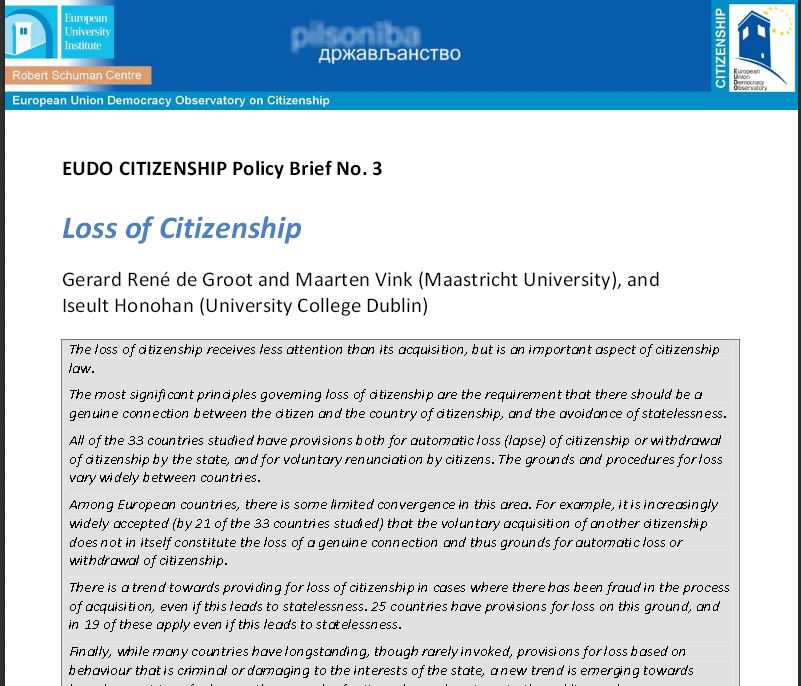Loss of citizenship: an interesting paper
Published:
November 2, 2013 at 11:55am
There’s a lot of confusion swirling about re individuals being stripped of their citizenship (possible only in circumstances when it is not a birthright), because of the government’s obfuscating lie that this is “unconstitutional”.
A reader sent in a link to this paper, which is worth reading. The link is below.
10 Comments Comment
Leave a Comment


http://eudo-citizenship.eu/docs/policy_brief_loss.pdf
Why hasn’t the EU come down hard on Muscat? Isn’t he abusing of a right that is granted only to EU citizens, which was earned through proving that it is ok for Maltese citizens to travel freely within the EU?
Isn’t Muscat planning on flooding the EU with people the EU doesn’t want?
There’s the UK and other countries complaining that the EU lets in undesirable individuals into their country and are trying to find a way to inhibit that, and now we have Muscat more than happy to let these people in.
Edward, I do not think that the EU can do anything at present. In my opinion it will only be able to do so once the issue is discussed and passed by Parliament, in short when it becomes law.
I think that in the first place, one should ask whether it is constitutional to sell citizenship.
Citizenship is not a commodity. It is a set of values, as explained by Simon Busuttil in Parliament this week, which define a group of people, and in our case, our nationhood.
If we as a group of people forming the Maltese nation do not agree that others claim to share those value with us merely because they have the money, then why should we share our nationality and citizenship with those persons?
I honestly believe that the government has no mandate from the electorate of Malta to introduce citizenship-for-cash, and that the consent of the electorate is necessary for this. A call for a referendum would have been the best option. But an election can have the same effect as a referendum, as we know from 2003.
Citizenship is not regarded as a human right as such, and it does not form part of the rights protected by the European Court of Human Rights (we are talking about that court which found that the Maltese Labour government would be violating human rights if it implemented push backs on African immigrants).
However, in the case Genovese v. Malta, the ECHR stated that:
“…even in the absence of family life, the denial of citizenship may raise an issue under Article 8 because of its impact on the private life of an individual, which concept is wide enough to embrace aspects of a person’s social identity. While the right to citizenship is not as such a Convention right and while its denial in the present case was not such as to give rise to a violation of Article 8, the Court considers that its impact on the applicant’s social identity was such as to bring it within the general scope and ambit of that Article.”
Before one can draw any conclusions from this case, one would need to read more about it. In fact, it was not exactly about the revocation of a citizenship, but the denial of one.
The case involved a young man who was born out of marriage to a Maltese father and a British mother. The young man had a British nationality and sought to acquire also a Maltese citizenship. Because he was born out of marriage, under Maltese law the young man was denied Maltese citizenship.
There were also some other claims about discrimination in that case.
In the case of the revokation of the Maltese passports and citizenship acquired by crooks for cash, it is likely that the court would be asked to look at whether those persons were impacted in their private life, whether they had a previous or concurrent nationality and why they may no longer have it, why and how they acquired a Maltese nationality, and so forth, as well as, whether a State can sell a nationality and later revoke it.
Interesting reading. Selling citizenship in the way this government plans to do, with full secrecy and without it having been earned by a true link to Malta, is not in Malta’s interest. It is therefore correct to remove as it never should have been given in the first place.
Talking about full secrecy – will the passports reflect the true details of the applicant?
Or will it allow for name changes and a completely new identity?
When I lived in the U.K. I changed my name legally by deed poll. This new name was accepted by all governments and my passport had new name.
My wife is Maltese and after we had been married for five years I was legally entitled to apply for Maltese citizenship. The process included interviews in Malta with my wife and me being interviewed separately and having to prove that we were still married and living together; investigations in the U.K. at my last three addresses, plus supplying my parent’s marriage certificate, father’s birth certificate, my wife’s and her father’s birth certificates plus her parents’ marriage certificate and of course my birth certificate.
They also required our passports.
The whole process took 18 months but I had to revert to my original name as Malta only recognised (until now) the name on a birth certificate. I am very proud to be a Maltese citizen and I am writing this to show you how thorough this process was before Labour came to power.
They’re well and truly shafted.
Has anyone in the government actually read the Constitution of Malta, especially the part regarding Citizenship ?
CHAPTER III
Citizenship
22. (1) The acquisition, possession, renunciation and loss of Maltese citizenship shall be regulated by law.